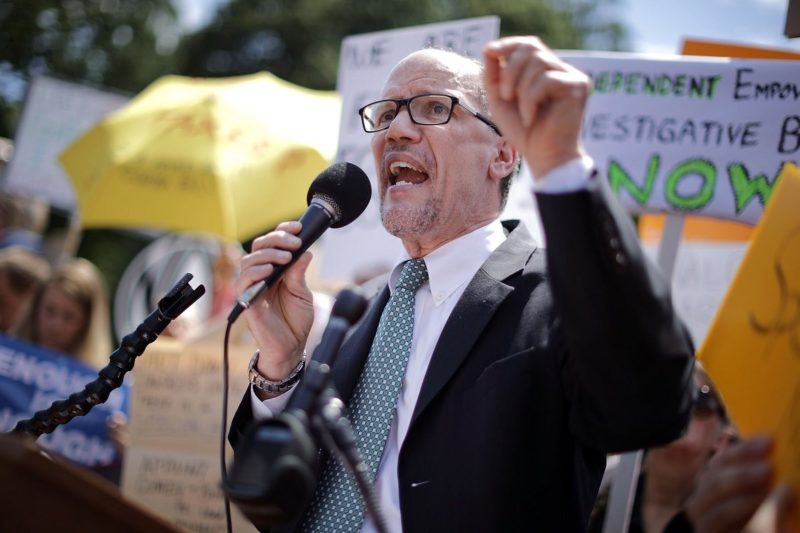DNC Chair Tom Perez to Meet With Anti-Choice Democrats
A board member for Democrats for Life of America has suggested Democratic lawmakers should support a 20-week abortion ban to gain GOP support for paid family leave.

Kristen Day, executive director of anti-choice group Democrats for Life of America (DFLA), confirmed to Rewire on Tuesday that the group was planning to meet with Democratic National Committee (DNC) Chair Tom Perez, though the specifics have yet to be scheduled.
Aides to Perez told the Atlantic in a report published Tuesday that Perez would meet with DFLA, and that the meeting came at the request of the group. It is to be “one of several conversations that Perez is having with pro-choice and pro-life Democrats,” the publication said.
When asked what the group aimed to discuss with Perez, Day said, “Like most Democrats we care about regaining our majority across the country. Republicans have control over 68 out of 99 state [legislative chambers] and full control over half the states. We want to work with our party to reverse numbers like that and build majorities that will pass legislation like Paid Family Leave.”
Charles C. Camosy, a DFLA board member, suggested in a 2016 Los Angeles Times op-ed that Democrats should allow a later abortion ban through Congress as “a carrot” to Republicans in exchange for policies like paid family leave.
“[A]s Democrats, we must unite and work together on the things that we do agree on,” Day said. “There is much more we agree on than disagree on. There are a lot of misconceptions about who pro-life Democrats are.”
DFLA leaders at the 2016 Democratic National Committee Convention in Philadelphia tried to “distance themselves from the traditionally Republican anti-choice movement, but repeatedly invoked conservative falsehoods and medically unsupported science to make their arguments against abortion,” Rewire reported.
The group encouraged the party to “open the big tent” for anti-choice politicians, claiming it would help Democrats win more elections, though it did not outline a plan to make those wins a reality.
At an event hosted by the organization, Day said she didn’t “know what the rationale was” behind the group’s support of 20-week abortion bans, though DFLA President Janet Robert relied on the unsupported claim that a fetus can feel pain at this point in a pregnancy to support the anti-choice measure.
Perez said last month that every Democrat, “like every American, should support a woman’s right to make her own choices about her body and her health,” according to the HuffPost. “That is not negotiable and should not change city by city or state by state.”
“At a time when women’s rights are under assault from the White House, the Republican Congress, and in states across the country,” he said, “we must speak up for this principle as loudly as ever and with one voice.”
The comments came amid backlash from pro-choice advocates who questioned why the Democratic Party was working with Heath Mello, given the Democratic Nebraska mayoral candidate’s anti-choice record while in the state legislature. Mello later said he would not endanger reproductive rights should he win. He was handily defeated in his bid for office this month.
Days before Perez made a statement embracing reproductive freedoms, he told the Washington Post, “If you demand fealty on every single issue, then it’s a challenge.”
“The Democratic Party platform acknowledges that we’re pro-choice, but there are communities … where people have a different position,” Perez said.
The 2016 Democratic platform did not shy away from an unwavering stance on abortion rights. “Democrats are committed to protecting and advancing reproductive health, rights, and justice,” the platform stated. “We believe unequivocally, like the majority of Americans, that every woman should have access to quality reproductive health care services, including safe and legal abortion—regardless of where she lives, how much money she makes, or how she is insured.”
The platform that year for the first time codified the Democratic Party’s commitment to ending the Hyde Amendment’s discriminatory ban on most federal funding for abortion care, which disproportionately affects people with low incomes and people of color.
